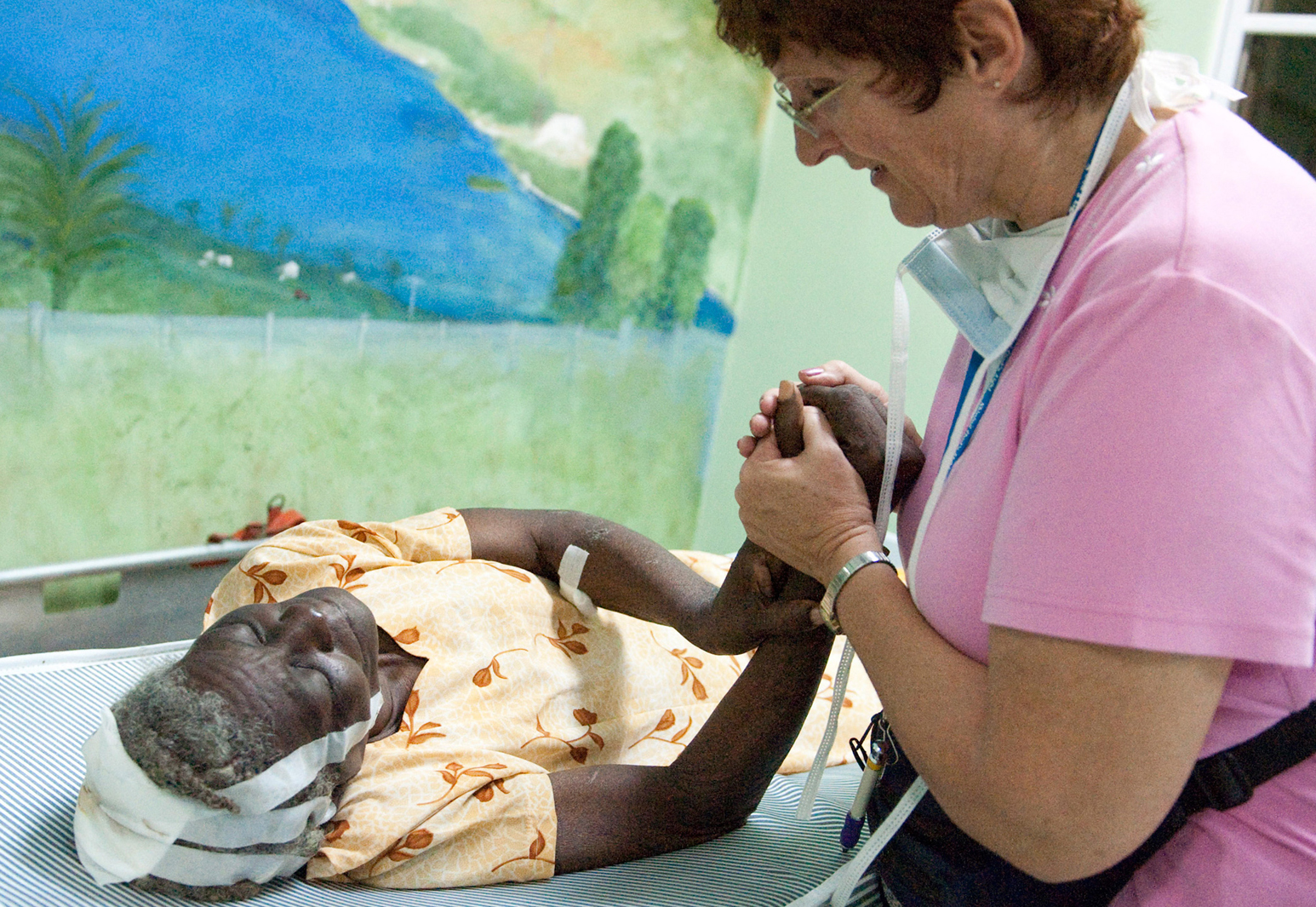
JIMANI, Dominican Republic (BP)–Delores York sits in the hallway of Good Samaritan Clinic just east of the Haiti border in the Dominican Republic. Her feet hurt. She’s exhausted. It’s been a long day for her and other clinic volunteers as earthquake victims fill every room, waiting for treatment.
Suddenly York, an International Mission Board missionary from Abilene, Texas, who has ministered among Haitians for the past 12 years, is back on her feet. She’s in the lobby holding hands with Claire, a woman about to go into surgery to repair her broken hip. Claire lost her home, looters stole everything she had and she — like so many others — lost loved ones in the 7.0 magnitude earthquake that rocked Haiti more than a week ago.
But the two women can’t stop smiling.
“She’s my sister,” York says proudly. “She’s happy about Jesus saving her life.”
“I have hope in God,” responds Claire. “God will get me through this.”
York and Claire just met at the clinic, but they’ve become fast friends since York speaks Claire’s Creole language. As hundreds of injured Haitians pour into the clinic, York and other IMB missionaries helping there provide a valuable skill as interpreters.
“Hardly anyone here speaks Creole,” said Dawn Goodwin, an IMB missionary from Jefferson City, Tenn. “We’re able to help the doctors understand what exactly is wrong with the patient, so they can give the treatment the patient needs.”
Language barriers only complicate the situation in what looks like a war zone, with patients scattered on mattresses throughout the clinic.
Patients include amputees, those with head wounds, infections and broken bones. They line the hallway as ambulances pull up to unload new patients.
The only available space for some is a patch of grass and dirt just outside the clinic. Rooms overflow with patients, exhausted doctors and other medical volunteers, some just trying to catch an hour or two of rest.
“It’s been a week since the earthquake — and they’re still coming,” Goodwin said.
Sleep isn’t something Goodwin, York or York’s husband, Sam, from Midwest City, Okla., have seen much of in the past few days.
“I just did a 24-hour shift,” Goodwin said. “I haven’t been able to get much sleep, but there aren’t enough translators.”
Interpreting is just part of what the IMB missionaries are doing. A day at the clinic can include everything from helping lift patients on and off beds to cleaning bathrooms.
The focus, however, remains the patients — most of whom have lost their homes as well as family and friends.
“Everything is gone,” said Junior, who was visiting his wife, a patient at the clinic. They lost their two children in the earthquake. “This is all we have,” he said as he pulled on his shirt.
“We have nowhere to go.”
After being released, many patients are transported to Bethel Baptist Church in Jimani, Dominican Republic, for temporary shelter. But their future remains uncertain.
For now, volunteers do what they can to comfort the hurting and wounded.
Goodwin said the sweetest moments at the clinic for her are times of praying for patients or singing songs of comfort.
But in the chaos, even those moments aren’t always easy.
“I was praying with someone the other day and just started blubbering,” said Goodwin, who has worked among Haitians for 17 years. “I’m grieving, too. I’ve lost friends. I have friends living on the street. Ministering to my people has been helpful. It’s helped my healing process.
“They have lost their identity, their palace … everything,” Goodwin added. “They come here because there is nowhere to go in Haiti. Some have been waiting here for days to receive treatment.”
Though doctors continue to rotate in, the number of patients is overwhelming. Workers at the clinic estimate they have treated more than 1,000 patients.
Another challenge is the equipment at the clinic. One evening, the X-ray machine was down, forcing doctors to cut open an arm or leg to feel for cracks or breaks in the bone.
While so many stories coming out of Haiti are sad, there also are miracles to report.
A woman and her 22-day-old baby were transported to the clinic after being rescued from the rubble of a building where they had been trapped for three days.
It’s easy to feel helpless and overwhelmed in the midst of crisis, York acknowledged. But she wouldn’t want to be anywhere else.
“For us, the hardest part would be not being here,” she says.
–30–
Alan James is a writer for the International Mission Board.
Southern Baptists can contribute to “Haiti Earthquake Disaster Relief” through their local church or directly to their state convention, the North American Mission Board (www.namb.net) or the International Mission Board (www.imb.org):
— Initial funding for the relief effort will come from the International Mission Board’s disaster relief fund. Contributions can be made online, www.imb.org, or by mail, International Mission Board, P.O. Box 6767, Richmond, VA 23230.
— The North American Mission Board has set up a Haiti disaster relief fund that will direct money to state conventions and other Southern Baptists who are doing relief work in Haiti. Donations may be made online, www.NAMB.net, by phone, 1-866-407-6262, or by mail, North American Mission Board, P.O. Box 116543, Atlanta, GA 30368-6543. Make checks payable to “Haiti Disaster Relief Fund/NAMB.”
Regardless of the SBC channel, all funds received for this purpose will go to relief efforts; none will be used for administrative costs.

















